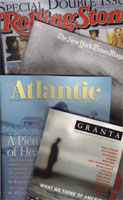|
|
Bill Di Nome | Trailer 5, Lot E | 962-7138 | dinomew@uncw.edu University of North Carolina at Wilmington, Department of English Class Hours: 6:307:45 p.m. | Tuesday& Thursday @ MO 201 Office Hours: Tuesdays 23 p.m. & by appointment
English 311-001 Professional Magazine Writing Spring 2008
|
|
|
Course Description & Requirements Manuscript Requirements & Submitting Electronic Files Materials: |
The news writer tells you the bridge fell in and how many cars fell off. The feature writer tells you what it was like to have been there. ~ Jules Loh, AP feature writer Course DescriptionOur focus is on writing nonfiction prose intended for magazines and newspapers. We will stress thematic development, story structure, literary style, marketing, and journalistic integrity. Our approach is hands-on: you will produce four full-length stories of various types, targeted to real markets. Additional work includes frequent written exercises, group work and quizzes. Discussions of professionally produced stories and work produced in class are a key component of the course; therefore, your active participation is too.
Objectives
Requirements1. Textbooks & Resources
2. Story Analyses (four). Prior to writing stories, we will analyze professionally written stories, focusing mainly on structure and sourcing.
(A1) News-feature analysis (A2) Service/How-To analysis (A3) Profile analysis (A4) Magazine-feature analysis
See Story-Analysis Instructions here.
3. Story assignments (four). All stories must be new (neither reworked from other classes nor previously published). Reporting must be authoritative and original, based on interviews you conduct yourself.
(S1) 300-800-word news feature plus supporting components (S2) 300-800-word service or how-to article plus supporting components (S3) 8002,000-word profile plus supporting components (S4) 1,0002,500-word magazine feature plus supporting components
See Story Assignments & Submission Components.
4. Exercises. Numerous, listed in Class Schedule. Some exercises will be group collaborations. 5. Quizzes. Three timed, open-book quizzes on AP Style regarding commonly used terms (list of terms will soon be available here), and one on media law (libel, copyright, privacy). The lowest quiz grade will be discarded. 6. Attendance. Regular attendance is mandatory. You are permitted two absences without penalty. Refer to the Grading policy for more information. 7. Conference. You are required to have at least one brief conference with me no later than Friday, Feb 29, either by telephone or in person. Please schedule in advance. Discussing the course capstone, the long magazine feature (S4), is especially important. 8. Computer competence. You should be adept at designing professional-looking letters and manuscripts, corresponding effectively by e-mail, handling e-mail attachments, saving files in various formats when needed and backing up critical documents. If you would like help with any of those, please don't hesitate to ask. I'm here to help. 9. E-mail and Seaport. E-mail is our official mode of communication and assignment submission, so check your campus e-mail frequently. I will use your UNCW e-mail address exclusively. Handouts will be posted on the class homepage in Seaport. If you have difficulties with your campus e-mail account, it is your responsibility to contact the Help Desk (ext. H-E-L-P) immediately to resolve the problem. You will be expected to submit assignments in hard copy on deadline. 10. Reading. This is foundational. You are expected to be conversant in all readings regardless of whether we discuss them explicitly in class.
|
